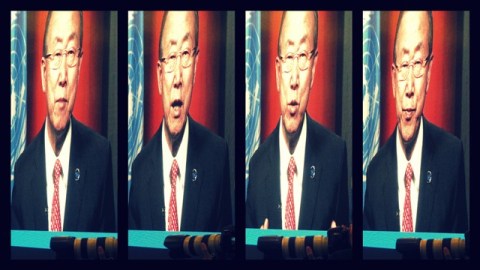Ban Ki-moon: Good Morning China!

Does Ban Ki-moon see China as the next superpower?
The General Secretary of the United Nations sent his warm greetings to Beijing Forum 2013, a governmental prestige project – thereby lending spiritual and political support to Beijing’s ambition of becoming the next superpower through its doctrine of “Peaceful development.”
The “Rise” of China (if that’s a good term, since it provokes anxiety and protectionism among its neighbors like Japan, South Korea, Philippines, etc.) seems almost inevitable, certainly irresistible to Western businessmen and pragmatists.
China bills on its latest policy of “Harmonious development” (hexie fazhan) – “Harmoniousness” being the current ideology of the Communist Party of China and seen on billboards syndicated throughout the nation. Hence the slogan of the Beijing Forum: ‘The Harmony of Civilizations and Prosperity for All.’
The first day of the Forum was held at the “Diaoyutai State Guesthouse” (not linked to the “Diaoyutai Islands” territorial conflict with Japan, but still…), the second day on the campus of Peking University, China’s leading institutions of Higher Education.
The long list of participants
The Beijing Forum is China’s cultural flagship, think tank, and publicity machine of intercultural Dialogue among Civilizations, a United Nations initiative. The Forum celebrates its 10th anniversary. It impresses with a long list of top-tier representatives, head of states, politicians, diplomats, Nobel Prize laureates, and scholars from around the world. Top participants in the past include Tony Blair, former British Prime Minister; A. P. J. Abdul Kalam, former President of India; Maha Chakri Sirindhorn, Princess of Thailand, to name but a few.
Secretary-General of Beijing Forum is YAN Jun, who is Deputy Director at the Office of International Relations, Peking University. Distinguished guest speakers in 2013 were ZHU Shanlu, Chairman of Peking University Council; Chey Tae-won, Chairman of SK Group of South Korea; WANG Enge, President of Peking University; H. E. Nassir Abdulaziz Al-Nasser, UN High Representative for Alliance of Civilizations; Kishore Mahbubani, Author of ‘Can Asians Think?’; Park In-kook, President of Korea Foundation for Advanced Studies; and Malcolm Grant, Chairman of National Health Service England. Distinguished panel speakers were YANG Rui, famed CCTV presenter; Kevin Rudd, Former Prime Minister of Australia; Jean-Christophe Bas, Deputy Director, United Nations Alliance of Civilizations; and Esko Aho, Former Prime Minister of Finland, and many more.
Internationalism on a local level, Localism on the global stage
The Beijing Forum proceedings were surprisingly modest, at least the visible parts; possibly in connection with Xi Jinping and Li Keqiang’s recent crusade against corruption and the Party’s nationwide call for restraint on the country’s wining and dining culture, as the income disparity and social unrest in China have reached dangerous new levels. [Three days earlier, three Uyghur terrorists (from China’s remote Xinjiang region) crashed their car into the Forbidden City’s main wall in Tiananmen Square, China’s political heart, injuring 40 bystanders.]
So it was observed, that coffee during the Forum’s ‘coffee breaks’ had to be purchased individually at RMB30-60 ($5-10) a cup. Ironically, it is often foreign clients –having been accustomed to (Confucian) over-the-top hospitality and Communist state-sponsored dinner banquets- who expect five-star hotels, generous reimbursement of their business flights, and meeting several high ranking officials (please!) despite the fact that China’s GDP per capita is barely one-eighth of that of the United States.
Image credit: East-West-Dichotomy.com




